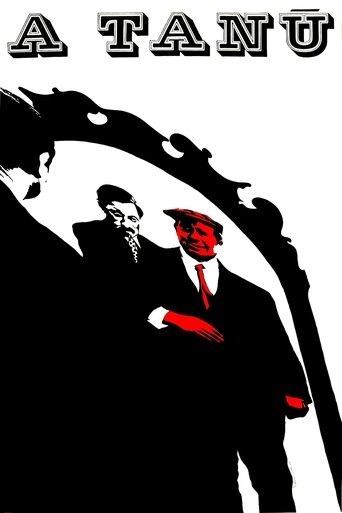
Pál Bánó
Дата народження: 23 лютого 1925
Знак зодіаку: Риби
Дата смерті: 7 червня 1998 (73 роки)
Місце народження: Міскольц (Угорщина)
Всього фільмів (на сайті): 1
Ролі: актор
Фільмографія
Сюжет (англ.)
Banned for over a decade for its outspoken criticism of the post-WWII communist regime in Hungary, Péter Bacsó's 'The Witness' has since then achieved unparalleled cult status in its native land. Known as the best satire about communism, 'The Witness' has become a cult classic, which was also well received by critics and general audiences alike when it was finally released outside of Hungary. Its candid and realistic portrayal of the incompetent communist regime has earned great acclaim for both the director and the film itself when it was shown at Cannes Film Festival in 1981. 'The Witness' takes place during the height of the Rákosi Era, which was closely modeled after the ruthless and brutal Stalin regime. The film follows the life of an ordinary dike keeper, József Pelikán, who has been caught for illegally slaughtering his pig, Dezsõ. Instead of doing hard time for his "heinous" crime, Pelikán is elevated into an important position, generally reserved for the communist elite. Of course, Pelikán is utterly clueless about his newfound luck, not to mention his new job. Even his new benefactor, the mysterious Comrade Virág, is reluctant to reveal the real reason behind Pelikán's preferential treatment. Thus, begins Pelikán's hilarious adventure deep within the "sophisticated" communist society. One failure after another the incompetent Pelikán is elevated higher and higher on the communist echelon, all the while remaining completely clueless about his promotions. Until one day, when he gets called for to return the "favour" by falsely testifying against his long-time friend in a mock-up show trial.The Witness (1969)
The Witness
актор у ролі Bíró
6 червня 1979 (Світ)
Угорщина
1 год 45 хв
Читати опис (англ.)
Banned for over a decade for its outspoken criticism of the post-WWII communist regime in Hungary, Péter Bacsó's 'The Witness' has since then achieved unparalleled cult status in its native land. Known as the best satire about communism, 'The Witness' has become a cult classic, which was also well received by critics and general audiences alike when it was finally released outside of Hungary. Its candid and realistic portrayal of the incompetent communist regime has earned great acclaim for both the director and the film itself when it was shown at Cannes Film Festival in 1981. 'The Witness' takes place during the height of the Rákosi Era, which was closely modeled after the ruthless and brutal Stalin regime. The film follows the life of an ordinary dike keeper, József Pelikán, who has been caught for illegally slaughtering his pig, Dezsõ. Instead of doing hard time for his "heinous" crime, Pelikán is elevated into an important position, generally reserved for the communist elite. Of course, Pelikán is utterly clueless about his newfound luck, not to mention his new job. Even his new benefactor, the mysterious Comrade Virág, is reluctant to reveal the real reason behind Pelikán's preferential treatment. Thus, begins Pelikán's hilarious adventure deep within the "sophisticated" communist society. One failure after another the incompetent Pelikán is elevated higher and higher on the communist echelon, all the while remaining completely clueless about his promotions. Until one day, when he gets called for to return the "favour" by falsely testifying against his long-time friend in a mock-up show trial.
Сайти
Фільтр
Останні рецензії
Свіжий ковток води
Аватар: Шлях води (2022)
Гідна екранізація всесвіту гриФолаут (2024)
ВсуперечБунтівний місяць. Частина 2: Та, що лишає шрами (2024)
Це не те, що ми полюбилиКороль Лев 3: Акуна Матата (2004)
На раз зійдеЧитерські скіли в ісекаї зробили мене імбою в реалі (2023)
Інший всесвітАватар (2009)
Останні коментарі до фільмів
Передивилася 10-й сезон і нарешті подивилась 11-й....
Цілком таємно (1993)
Хороший фільм про користь трудотерапії) Правда, є ...Життя, як дім (2001)
Один з найкращих українських фільмів, які я бачила...Довбуш (2023)
Це краще за першу частину 👍👍👍...Бунтівний місяць. Частина 2: Та, що лишає шрами (2024)
Ендрю Скотту до біса личать ролі негідників...Ріплі (2024)
Доволі нудна психологічна драма з нецікавими персо...Карта звуків Токіо (2009)
Питали де легально. запіратити, певен, більшість ...Фолаут (2024)
Нещодавно переглянуті:



